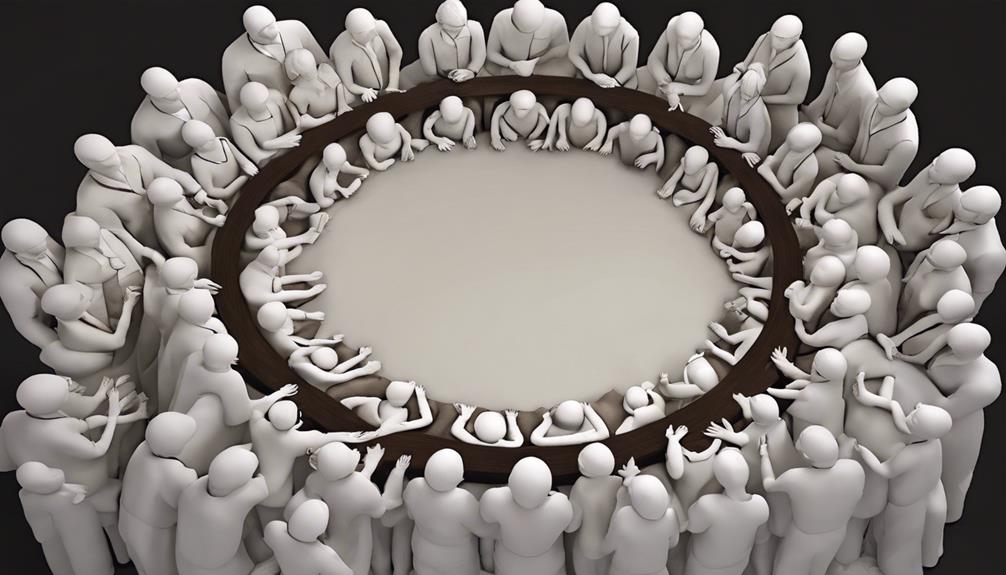In our journey towards healing and personal growth after a divorce, we often explore unfamiliar grounds, seeking ways to refresh and grow.
Each step taken carries us closer to a future filled with possibilities and newfound strength.
It is in these moments of transition that we realize the resilience within us, waiting to be awakened by the choices we make.
As we embark on this transformative process, we discover the power of self-discovery and the potential for a life redefined.
Key Takeaways
- Acknowledge and process emotions for healing, seeking support from loved ones.
- Prioritize self-care and therapy for emotional well-being post-divorce.
- Establish boundaries, invest in personal growth, and navigate relationships effectively.
- Engage in self-exploration, learn new skills, and build support networks for personal growth.
Acknowledge Your Emotions
Acknowledging our emotions is a crucial step in the journey towards healing and moving forward after a divorce. When going through such a significant life change, it's natural to experience a range of feelings – sadness, anger, confusion, or even relief. It's essential to acknowledge and accept these emotions without judgment. By allowing ourselves to feel and process these emotions, we pave the way for emotional healing and rebuilding our lives post-divorce.
Divorce can stir up a whirlwind of emotions, and it's okay to feel overwhelmed at times. Validating your feelings, no matter how complex or conflicting they may be, is key to emotional recovery. Suppressing emotions can hinder the healing process, so it's important to give yourself permission to experience and express what you're going through. Remember, acknowledging your emotions is the first step towards rebuilding your life after divorce. It sets the foundation for growth, resilience, and eventual renewal.
Seek Support From Loved Ones

As we navigate the emotional rollercoaster of divorce, seeking support from our loved ones can provide a vital anchor in the storm. Engaging with friends and family during this challenging time is essential for emotional healing and rebuilding our lives. Here's how loved ones can help us through this process:
- Emotional Support: Lean on your support system for a listening ear and a shoulder to lean on. Honest conversations about your feelings and needs can provide comfort and reassurance as you navigate the healing process.
- Understanding and Validation: Share your experiences and concerns with trusted family members to feel understood and validated. Their empathy and support can help you feel less alone during this difficult time.
- Encouragement and Empathy: Surround yourself with a strong support system that can offer encouragement and empathy. Having loved ones who believe in you and your ability to rebuild your life after divorce can be incredibly empowering. Trust in their support as you move forward on your healing journey.
Focus on Self-Care and Healing
As we navigate the challenging journey of rebuilding our lives after divorce, it's crucial to prioritize our well-being. Seeking professional help, such as therapy or counseling, can provide valuable support and guidance through this period of healing.
Remember to practice self-compassion and set boundaries as we focus on our emotional and mental health.
Prioritize Your Well-Being
To prioritize your well-being after divorce, focus on self-care and healing to nurture your mental and emotional health. Engaging in activities like therapy, meditation, or exercise can aid in the recovery process.
Here are three key steps to help you prioritize your well-being:
- Set Boundaries: Establish boundaries with toxic influences to protect your mental and emotional well-being.
- Focus on Personal Growth: Concentrate on personal development and growth to rebuild a stronger foundation for yourself.
- Practice Self-Compassion: Take time to process your emotions, practice self-compassion, and forgive yourself as you navigate through this challenging time.
Seek Professional Help
Establishing a support system through seeking professional help can be a crucial step in prioritizing self-care and healing after divorce.
Therapy or counseling offers valuable tools to navigate emotional challenges and promote self-care practices. Professional therapists guide individuals in rebuilding self-esteem, managing complex emotions, and fostering resilience post-divorce.
Through therapy sessions, one can address underlying issues, facilitate personal growth, and kickstart emotional healing. Accessing professional support is essential for nurturing mental health, prioritizing self-care, and enhancing overall well-being as part of the journey to rebuild life after divorce.
Practice Self-Compassion
Practicing self-compassion during the healing process post-divorce nurtures emotional well-being and encourages resilience. Engaging in self-care activities is crucial for fostering emotional healing and boosting self-esteem. Here are three self-compassionate practices to aid in your journey:
- Meditation: Take time to quiet your mind, reflect on your emotions, and practice self-forgiveness.
- Exercise: Physical activity releases endorphins, reduces stress, and promotes a sense of well-being.
- Healthy Eating: Nourish your body with nutritious foods to support your overall health and vitality.
Rediscover Your Identity

Rediscovering your identity after divorce can be a transformative and empowering journey of self-exploration. It's a time to reflect on who you are, your values, and your desires for the future. To help you in this process, consider the following:
| Reflect on Personal Identity | Explore New Hobbies | Seek Therapy |
|---|---|---|
| Take time to understand who you are beyond the relationship. | Engage in activities that reconnect you with your passions. | Consider therapy to gain clarity on your self-identity. |
| Reconnect with your values and beliefs. | Try out new things to discover what brings you joy. | Process your emotions and thoughts in a safe space. |
| Define your goals for personal growth. | Step out of your comfort zone to find new interests. | Utilize counseling to navigate through this period of change. |
Embrace this opportunity to redefine yourself, embracing change and growth as you move forward. Remember, this is a new chapter in your life, and it's a chance to discover the best version of yourself.
Embrace New Opportunities

As we navigate the aftermath of divorce, embracing new opportunities can be both liberating and invigorating.
Discovering hidden passions, taking calculated risks, and seizing unexpected chances can pave the way for a fulfilling post-divorce life.
It's about stepping out of our comfort zones, being open to change, and allowing ourselves to grow in ways we never imagined.
Discovering Hidden Passions
Exploring new hobbies and interests can lead us to uncover hidden passions and talents we never knew we had, offering a pathway to personal growth and fulfillment post-divorce. Engaging in activities that ignite our curiosity and enthusiasm can bring a renewed sense of purpose and joy into our lives.
Here are three ways discovering hidden passions can help us rebuild after divorce:
- Finding Joy: Pursuing a new hobby can bring moments of happiness and excitement, helping us navigate through the challenges of divorce with a positive outlook.
- Personal Growth: Discovering hidden passions allows us to evolve personally, gaining new skills and insights that contribute to our overall development.
- Redefining Identity: Exploring exciting experiences post-divorce can aid in reshaping our self-concept and creating a fresh narrative for our future journey.
Taking Calculated Risks
Embracing new opportunities after divorce can be a transformative step towards personal growth and fulfillment. It's a time to take calculated risks and explore uncharted territories in your new life after divorce.
Stepping out of your comfort zone, with the support of a strong system, can lead to positive steps toward rebuilding. Trying new activities not only benefits your mental health but also contributes to your physical health.
By being open to change, you allow for exciting possibilities to unfold. Taking risks may seem daunting, but it can help rediscover passions and interests that were once hidden.
Embrace this chance to redefine yourself and create a life that aligns with your true desires.
Seizing Unexpected Chances
Stepping forward into new opportunities post-divorce can open doors to a fresh start and unexpected growth. Embracing the chance to redefine your identity and pursue neglected aspirations can lead to a fulfilling life after divorce. Here are some ways to seize unexpected chances:
- Exploring Possibilities: Take the time to consider new paths and opportunities that align with your interests and values.
- Personal Growth: Embrace change as a catalyst for self-improvement and development, allowing yourself to grow beyond the constraints of your past.
- Renewed Purpose: Seizing unexpected chances can reignite your sense of purpose and lead to a happier, more fulfilling future.
Take Charge of Your Finances

Taking control of our finances after a divorce is crucial for securing our financial future and stability. It's essential to create a post-divorce budget to accurately track income and expenses. Consider consulting a financial advisor to help plan for long-term financial stability. Updating financial accounts and documents to reflect your new financial situation is also necessary. Developing a savings strategy to build an emergency fund and save for future goals can provide a sense of financial security. Exploring new job opportunities or career paths to enhance your financial well-being is a proactive step towards rebuilding your life after divorce.
| Financial Steps | Description |
|---|---|
| Create a Budget | Track income and expenses accurately to manage finances effectively. |
| Consult a Financial Advisor | Seek professional guidance to plan for long-term financial stability. |
| Update Accounts and Documents | Ensure all financial records reflect your new post-divorce financial status. |
| Develop a Savings Strategy | Build an emergency fund and save for future financial goals. |
Set Boundaries and Prioritize Self-Growth

Establishing clear boundaries with your ex-spouse is essential for maintaining a healthy post-divorce relationship and prioritizing self-growth. It can be challenging to navigate this new dynamic, but setting limits on communication and interactions is crucial for protecting your emotional well-being. Here are three practical steps to help you in this process:
- Create Space to Grieve: Allow yourself to feel and process the emotions that come with the end of a marriage. Give yourself permission to grieve the loss and take the time you need to heal.
- Make Plans for Self-Care: Invest time and energy in activities that promote self-care and positive development. Focus on rediscovering your identity and nurturing your growth after divorce.
- Find New Opportunities: Use this transition as an opportunity to explore new interests and possibilities. Surround yourself with a supportive environment that encourages your personal growth and helps you move forward confidently.
Frequently Asked Questions
What Are the Stages of Healing After Divorce?
The stages of healing after divorce – denial, anger, bargaining, depression, and acceptance – are a natural part of the grieving process. Progression through these stages isn't linear, but seeking support and processing emotions aids personal growth.
How Do I Restart My Life After Divorce?
We restart our lives after divorce by embracing our emotions, setting new goals, rediscovering ourselves, seeking support from loved ones, and possibly seeking therapy. It's essential to grieve, grow, and navigate this journey with patience and self-compassion.
How Long Does It Take to Rebuild Your Life After Divorce?
Rebuilding after divorce can be like a marathon journey. It varies for each of us, taking months to a few years. Factors like support and resilience play a role. On average, it may take 2-3 years to fully recover.
How Do You Move on After Divorce When You Still Love Him?
We understand the struggle of moving on when love remains. Prioritize self-care, seek support, and allow time to grieve. Reflect on the reasons for divorce and focus on personal growth. Healing is a journey.
Conclusion
As we embark on this journey of rebuilding our lives after divorce, let's remember to dance through the storm, laugh in the face of chaos, and sprinkle a little bit of glitter on our wounds.
Let's embrace the messiness, find beauty in the brokenness, and create a masterpiece out of our scars.
Together, we can turn our pain into power, our tears into triumph, and our heartbreak into healing.
Here's to new beginnings, fierce resilience, and the endless possibilities that await us. Cheers to us, the warriors of love and liberation.










